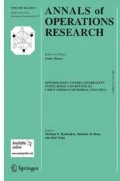Abstract
In this paper we consider the resource-constrained project scheduling problem with multiple execution modes for each activity and makespan minimization as objective. We present a new genetic algorithm approach to solve this problem. The genetic encoding is based on a precedence feasible list of activities and a mode assignment. After defining the related crossover, mutation, and selection operators, we describe a local search extension which is employed to improve the schedules found by the basic genetic algorithm. Finally, we present the results of our thorough computational study. We determine the best among several different variants of our genetic algorithm and compare it to four other heuristics that have recently been proposed in the literature. The results that have been obtained using a standard set of instances show that the new genetic algorithm outperforms the other heuristic procedures with regard to a lower average deviation from the optimal makespan.
Similar content being viewed by others
References
K. Backhaus, B. Erichson, W. Plinke and R. Weiber, Multivariate Analysemethoden: Eine anwendungsorientierte Einführung (Springer, Berlin, Germany, 1996).
F.F. Boctor, Heuristics for scheduling projects with resource restrictions and several resource-duration modes, International Journal of Production Research 31 (1993) 2547–2558.
F.F. Boctor, An adaptation of the simulated annealing algorithm for solving resource-constrained project scheduling problems, International Journal of Production Research 34 (1996) 2335–2351.
F.F. Boctor, A new and efficient heuristic for scheduling projects with resource restrictions and multiple execution modes, European Journal of Operational Research 90 (1996) 349–361.
K. Bouleimen and H. Lecocq, A new efficient simulated annealing algorithm for the resource-constrained project scheduling problem, in: Proceedings of the Sixth International Workshop on Project Management and Scheduling, eds. G. Barbaroso?lu, S. Karabat?, L. Özdamar and G. Ulusoy (Bo?aziçi University Printing Office, Istanbul, 1998) pp. 19–22.
A. Drexl and J. Grünewald, Nonpreemptive multi-mode resource-constrained project scheduling, IIE Transactions 25 (1993) 74–81.
A.E. Eiben, E.H.L. Aarts and K.M. van Hee, Global convergence of genetic algorithms: A Markov chain analysis, in: Lecture Notes in Comput. Sci. 496 (1990) pp. 4–12.
S.E. Elmaghraby, Activity Networks: Project Planning and Control by Network Models (Wiley, New York, 1977).
D.E. Goldberg, Genetic Algorithms in Search, Optimization, andMachine Learning (Addison-Wesley, Reading, MA, 1989).
S. Hartmann, A competitive genetic algorithm for resource-constrained project scheduling, Naval Research Logistics 45 (1998) 733–750.
S. Hartmann and A. Drexl, Project scheduling with multiple modes: A comparison of exact algorithms, Networks 32 (1998) 283–297.
S. Hartmann and R. Kolisch, Experimental investigation of state-of-the-art heuristics for the resource-constrained project scheduling problem, European Journal of Operational Research 127 (2000) 399–407.
H.J. Holland, Adaptation in Natural and Artificial Systems (University of Michigan Press, Ann Arbor, 1975).
U. Kohlmorgen, H. Schmeck and K. Haase, Experiences with fine-grained parallel genetic algorithms, Annals of Operations Research, forthcoming.
R. Kolisch, Serial and parallel resource-constrained project scheduling methods revisited: Theory and computation, European Journal of Operational Research 90 (1996) 320–333.
R. Kolisch and A. Drexl, Adaptive search for solving hard project scheduling problems, Naval Research Logistics 43 (1996) 23–40.
R. Kolisch and A. Drexl, Local search for nonpreemptive multi-mode resource-constrained project scheduling, IIE Transactions 29 (1997) 987–999.
R. Kolisch and S. Hartmann, Heuristic algorithms for solving the resource-constrained project scheduling problem: Classification and computational analysis, in: Project Scheduling: Recent Models, Algorithms and Applications, ed. J. W?glarz (Kluwer, Amsterdam, the Netherlands, 1999) pp. 147–178.
R. Kolisch and A. Sprecher, PSPLIB-a project scheduling problem library, European Journal of Operational Research 96 (1996) 205–216.
R. Kolisch, A. Sprecher and A. Drexl, Characterization and generation of a general class of resource-constrained project scheduling problems, Management Science 41 (1995) 1693–1703.
Z. Michalewicz, Heuristic methods for evolutionary computation techniques, Journal of Heuristics 1 (1995) 177–206.
M. Mori and C.C. Tseng, A genetic algorithm for the multi-mode resource-constrained project scheduling problem, European Journal of Operational Research 100 (1997) 134–141.
L. Özdamar, A genetic algorithm approach to a general category project scheduling problem, IEEE Transactions on Systems, Man, and Cybernetics, Part C: Applications and Reviews 29 (1999) 44–59.
R. Slowinski, Two approaches to problems of resource allocation among project activities: A comparative study, Journal of the Operational Research Society 31 (1980) 711–723.
R. Slowinski, B. Soniewicki and J. W?glarz, DSS for multiobjective project scheduling subject to multiple-category resource constraints, European Journal of Operational Research 79 (1994) 220–229.
A. Sprecher, Resource-Constrained Project Scheduling: Exact Methods for the Multi-Mode Case, Lecture Notes in Economics and Mathematical Systems 409 (Springer, Berlin, Germany, 1994).
A. Sprecher and A. Drexl, Multi-mode resource-constrained project scheduling by a simple, general and powerful sequencing algorithm, European Journal of Operational Research 107 (1998) 431–450.
A. Sprecher, S. Hartmann and A. Drexl, An exact algorithm for project scheduling with multiple modes, OR Spektrum 19 (1997) 195–203.
F.B. Talbot, Resource-constrained project scheduling with time-resource tradeoffs: The nonpreemptive case, Management Science 28 (1982) 1197–1210.
D. Whitley, V.S. Gordon and K. Mathias, Lamarckian evolution, the Baldwin effect and function optimization, in: Proceedings of the Parallel Problem Solving from Nature (Springer, Berlin, Germany, 1994) pp. 6–15.
Author information
Authors and Affiliations
Rights and permissions
About this article
Cite this article
Hartmann, S. Project Scheduling with Multiple Modes: A Genetic Algorithm. Annals of Operations Research 102, 111–135 (2001). https://doi.org/10.1023/A:1010902015091
Issue Date:
DOI: https://doi.org/10.1023/A:1010902015091




